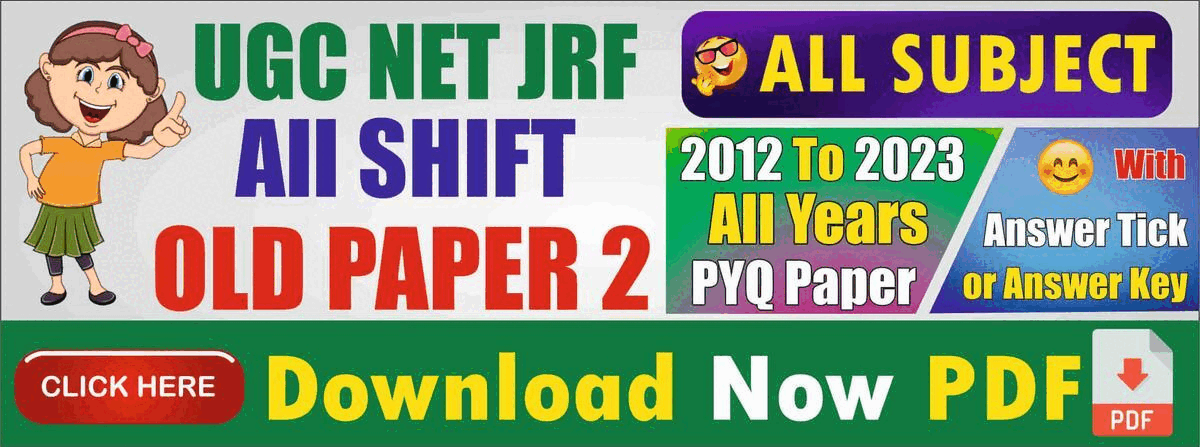Are you searching for the UGC NET Law Syllabus 2023 PDF Download? Look no further, as we have compiled all the important details and tips to help you prepare for the exam.
The UGC NET Law exam is conducted by the National Testing Agency (NTA) for candidates who wish to pursue a career in the field of Law. The exam assesses the candidates’ knowledge in the subject and tests their eligibility for lectureship and research fellowships.
If you are planning to appear for the UGC NET Law 2023 exam, it is important to have a thorough understanding of the syllabus and exam pattern. In this article, we have compiled all the important information you need to know about the UGC NET Law Syllabus 2023 PDF Download
UGC NET Law Exam Pattern 2023:
The UGC NET Law exam consists of two papers – Paper 1 and Paper 2. Both papers are conducted on the same day, and the duration of each paper is 3 hours. The exam is conducted online, and each question carries 2 marks. There is no negative marking for incorrect answers.
The UGC NET Law Exam consists of two papers: Paper 1 and Paper 2.
Paper 1:
- Duration: 3 hours
- Number of questions: 50
- Total marks: 100
- Type of questions: Multiple Choice Questions (MCQs) based on general aptitude, teaching and research aptitude, and current affairs.
Paper 2:
- Duration: 3 hours
- Number of questions: 100
- Total marks: 200
- Type of questions: MCQs based on Law subjects.
Both papers are conducted in a single session with no break in between. The candidates are required to appear for both papers to be considered for the selection process.
It’s important to note that there is no negative marking for incorrect answers in UGC NET Law Exam.
UGC NET Law Syllabus 2023: Download PDF
The UGC NET Law syllabus is divided into two parts – Paper 1 and Paper 2. Here’s a detailed syllabus for both papers.
Paper 1 Syllabus:
Teaching Aptitude:
- Teaching: Nature, objectives, characteristics, and basic requirements.
- Learner’s characteristics: Characteristics of adolescent and adult learners, and individual differences.
- Methods of teaching: Teacher-centered vs. learner-centered methods; Off-line vs. online methods.
- Evaluation systems: Elements and types of evaluation, evaluation in higher education, and grading system.
Research Aptitude:
- Research: Meaning, types, and characteristics.
- Steps of research.
- Methods of research.
- Research Ethics.
Reading Comprehension:
- Comprehension passages.
Communication:
- Communication: Nature, characteristics, types, barriers, and effective communication.
- Verbal and non-verbal communication.
- Classroom communication.
Logical Reasoning:
- Understanding the structure of arguments.
- Evaluating and distinguishing deductive and inductive reasoning.
- Verbal analogies.
Data Interpretation:
- Sources, acquisition, and interpretation of data.
- Quantitative and qualitative data.
- Graphical representation and mapping of data.
Paper 2 Syllabus:
Nta Ugc Net Law Syllabus 2023 in English
UNIT – I: JURISPRUDENCE
1. Nature and sources of law 2. Schools of jurisprudence 3. Law and morality 4. Concept of rights and duties 5. Legal personality 6. Concepts of property, ownership and possession 7. Concept of liability 8. Law, poverty and development 9. Global justice 10. Modernism and post-modernism
UNIT – II: CONSTITUTIONAL AND ADMINISTRATIVE LAW
1. Preamble, fundamental rights and duties, directive principles of state policy. 2. Union and State executive and their interrelationship 3. Union and State legislature and distribution of legislative powers 4. Judiciary 5. Emergency provisions 6. Temporary, transitional and special provisions in respect of certain states 7. Election Commission of India 8. Nature, scope and importance of administrative law 9. Principle of natural justice 10. Judicial review of administrative actions – Grounds.
UNIT – III: PUBLIC INTERNATIONAL LAW AND IHL
1. International law – Definition, nature and basis
2. Sources of International law 3. Recognition of states and governments 4. Nationality, immigrants, refugees and internally displaced persons (IDPs) 5. Extradition and asylum 6. United Nations and its organs 7. Settlement of international disputes 8. World Trade Organization (WTO) 9. International humanitarian law (IHL) – Conventions and protocols 10. Implementation of IHL – Challenges
UNIT – IV: LAW OF CRIMES
1. General principles of criminal liability – Actus reus and mens rea, individual and
group liability and constructive liability 2. Stages of crime and inchoate crimes – Abetment, criminal conspiracy and attempt 3. General exceptions 4. Offences against human body 5. Offences against state and terrorism 6. Offences against property 7. Offences against women and children 8. Drug trafficking and counterfeiting 9. Offences against public tranquility 10. Theories and kinds of punishments, compensation to the victims of crime
UNIT – V: LAW OF TORTS AND CONSUMER PROTECTION
1. Nature and definition of tort 2. General principles of tortious liability 3. General defenses 4. Specific torts – Negligence, nuisance, trespass and defamation 5. Remoteness of damages 6. Strict and absolute liability 7. Tortious liability of the State 8. The Consumer Protection Act 1986 – Definitions, consumer rights and redressal
mechanism 9. The Motor Vehicles Act, 1988 – No fault liability, third party insurance and claims
tribunal 10. The Competition Act, 2002 – Prohibition of certain agreements, abuse of dominant
position and regulation of combinations
UNIT – VI: COMMERCIAL LAW
1. Essential elements of contract and e-contract 2. Breach of contract, frustration of contract, void and voidable agreements 3. Standard form of contract and quasi-contract 4. Specific contracts – Bailment, pledge, indemnity, guarantee and agency 5. Sale of Goods Act, 1930 6. Partnership and limited liability partnership 7. Negotiable Instruments Act, 1881 8. Company law – Incorporation of a company, prospectus, shares and debentures 9. Company law – Directors and meetings 10. Corporate social responsibility
UNIT-VII: FAMILY LAW
1. Sources and schools 2. Marriage and dissolution of marriage 3. Matrimonial remedies – Divorce and theories of divorce 4. Changing dimensions of institution of marriage – Live-in relationship 5. Recognition of foreign decrees in India on marriage and divorce 6. Maintenance, dower and stridhan 7. Adoption, guardianship and acknowledgement 8. Succession and inheritance 9. Will, gift and wakf 10. Uniform Civil Code
UNIT –VIII: ENVIRONMENT AND HUMAN RIGHTS LAW
1. Meaning and concept of ‘environment’ and ‘environmental pollution’ 2. International environmental law and UN Conferences 3. Constitutional and legal framework for protection of environment in India 4. Environmental Impact Assessment and control of hazardous waste in India 5. National Green Tribunal 6. Concept and development of human rights 7. Universalism and cultural relativism 8. International Bill of Rights 9. Group rights – Women, children, persons with disabilities, elderly persons,
minorities and weaker sections 10. Protection and enforcement of human rights in India – National Human Rights Commission, National Commission for Minorities, National Commission for Women, National Commission for Scheduled Castes, National Commission for Schedule Tribes and National Commission for Backward Classes
UNIT – IX: INTELLECTUAL PROPERTY RIGHTS AND INFORMATION
TECHNOLOGY LAW
1. Concept and meaning of intellectual property 2. Theories of intellectual property 3. International conventions pertaining to intellectual properties 4. Copyright and neighboring rights – Subject matters, limitations and exceptions,
infringement and remedies 5. Law of patent – Patentability, procedure for grant of patent, limitations and
exceptions, infringement and remedies 6. Law of trademark – Registration of trademarks, kinds of trademarks, infringement
and passing off, remedies 7. Protection of Geographical Indications 8. Bio-diversity and Traditional Knowledge 9. Information technology law- digital signature and electronic signature, electronic
governance, electronic records and duties of subscribers 10. Cyber crimes, penalties and adjudication
UNIT – X: COMPARATIVE PUBLIC LAW AND SYSTEMS OF GOVERNANCE
1. Comparative Law – Relevance, methodology, problems and concerns in Comparison 2. Forms of governments – Presidential and parliamentary, unitary and federal 3. Models of federalism – USA, Canada and India 4. Rule of Law – ‘Formal’ and ‘substantive’ versions 5. Separation of powers – India, UK, USA and France 6. Independence of judiciary, judicial activism and accountability – India, UK and
USA 7. Systems of constitutional review – India, USA, Switzerland and France 8. Amendment of the Constitution – India, USA and South Africa 9. Ombudsman –Sweden, UK and India 10. Open Government and Right to Information – USA, UK and India
Paper 2 Syllabus Download Pdf:
Ugc Net Law Syllabus 2023 in English
Ugc Net Law Syllabus 2023 in Hindi
Preparation Tips for UGC NET Law Exam 2023:
Here are some tips for preparing for the UGC NET Law exam 2023:
- Understand the syllabus and exam pattern thoroughly.
- Make a study plan
- Refer to standard textbooks and study materials recommended for the exam.
- Practice previous year question papers and mock tests.
- Focus on time management and accuracy while attempting the questions.
- Take regular breaks and maintain a healthy lifestyle to avoid burnout.
- Join coaching classes or online courses if necessary.
- Stay updated with current affairs related to the Law field.
Important Points:
- The UGC NET Law exam is conducted by NTA for candidates who wish to pursue a career in Law.
- The exam assesses the candidates’ knowledge in the subject and tests their eligibility for lectureship and research fellowships.
- The exam pattern of UGC NET Law 2023 includes multiple-choice questions and is conducted in online mode.
- The marking scheme of the exam is +2 for a correct answer and no negative marking for incorrect answers.
- The duration of the exam is 3 hours, and the number of questions is 150.
- The UGC NET Law Syllabus 2023 PDF Download is an important document that provides a detailed outline of the topics that will be covered in the exam.
- To download the syllabus, candidates can visit the official website of NTA and click on the link provided.
- The syllabus is available in PDF format and can be downloaded for free.
- The syllabus is divided into nine units, each covering a specific topic related to Law.
- To prepare for the exam, candidates must understand the syllabus, make a study plan, practice previous year question papers, join a coaching institute, take mock tests, and revise regularly.
FAQs:
- Is there any negative marking in the UGC NET Law exam 2023? Ans: No, there is no negative marking for incorrect answers.
- Can I download the UGC NET Law Syllabus 2023 PDF from the official website? Ans: Yes, the syllabus is available for download on the official website of NTA.
- What is the duration of the UGC NET Law exam 2023? Ans: The duration of each paper is 3 hours.
Also Check:
Conclusion:
In conclusion, the UGC NET Law exam 2023 is a crucial opportunity for aspirants who want to pursue a career in the teaching or research field. To crack the exam, it’s essential to have a clear understanding of the syllabus, exam pattern, and prepare accordingly. With a comprehensive understanding of the UGC NET Law Syllabus 2023 PDF download and proper preparation, you can clear the exam with flying colors.





